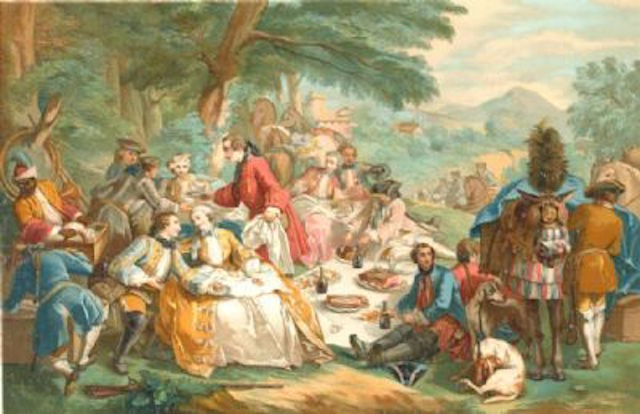
La Maréchale d’Aubemer, Nouvelle du XVIIIème Siècle, or The Widow of Field Marshal d’Aubemer: A Novella of the 18th Century, posthumously published in 1867, is a novel by the author and memoirist Madame de Boigne, born Adélaïde d’Osmond (1781-1866). Mine is the first English translation, available here for the first time anywhere.
In Chapter 7, the Saveuses join the Maréchale and the Montfords — including Henri d’Estouteville, of course — in the country for Easter.
THE WIDOW OF FIELD MARSHAL D’AUBEMER: A NOVELLA OF THE 18TH CENTURY
CHAPTER SEVEN
Easter in the Country
It was the Duchesse de Montford’s custom to spend the Easter fortnight in a chateau belonging to the Crown; her husband’s position as its Keeper1 gave her the use of it, not, perhaps, the better to fulfill her obligations to the Church, but the better to avoid them conveniently. Spring came early that year, and the doctors having recommended a change of air, the Maréchale allowed herself to be talked into following her friend. The Saveuses were invited to join her. Henri d’Estouteville was there almost as a resident and visitors did not lack, as many from Paris as from the neighbourhood, which promised some very agreeable holidays. Mme de Rieux had eagerly supported her mother’s invitation to Mme de Saveuse. Like all mediocre people, she was subject to infatuations, and her passion for the Comtesse Lionel knew no bounds since, in addition to the advantage of displeasing the Princesse Simon, the Comtesse had by her kindness won the endorsement of the little Rieux.
The chateau’s company was assembled for lunch when the sound of a carriage announced new guests, and M and Mme de Saveuse were shown in. The Princesse Simon could not restrain a gesture of impatience, but after a quick appraisal of the new feminine arrival, she cast a satisfied glance at the mirror in which her elegant silhouette was reflected and recovered her good humour.
As often happens in our climate at that time of year, the fine weather of the week before had been replaced by wintry weather. Lionel, having watched Estouteville set off in a caleche when the weather was fine, had judged it indispensable to imitate him despite the cold that had suddenly set in. His wife, accustomed to braving the inclemency of the seasons, had raised no objections, but she had put on the work of a Limoges dressmaker, an inelegant broadcloth coat-dress. Her appearance, battered for three hours by rime ice driven by a northeastern wind, presented blue cheeks and a red nose. Her hair hung in damp, uncurled locks alongside her discomposed face, which she had swaddled in a thick orange scarf knotted crudely on her neck, where it showed yellow reflections. In a word, she was ugly, inasmuch as a charming woman can be at twenty, and her rustic ensemble formed a veritable contrast to the refreshed appearances and refined yet simple dresses that she was surrounded by. The Maréchale was keenly vexed; as for Mme de Saveuse, she seemed oblivious. Mme de Rieux, compassionate at bottom and convinced that a sartorial shortcoming was a true disaster, had the Comtesse placed next to her at table and very gladly set about trying to distract her from the state of suffering that she supposed her to be in by recounting all the pretty tricks perpetrated by her children since their departure from Paris.
Unable to resist malice any longer, and believing that Mme de Saveuse’s discomfiture had been insufficiently observed, Princesse Simon remarked in a rather loud voice on the difference that candlelight made to the appearance of some people.
“I have never seen Mme de Saveuse except in the evening. She’s quite another person. I don’t know that I would have recognized her. She’s always charming, but I didn’t picture her as she is this morning. It’s really quite a different appearance!”
“Dear princess,” replied the Maréchale in a bittersweet tone, “would that your benevolence not be too attached to the sight you see before you. My niece’s appearance could well change before the end of lunch.”
Mme de Rieux’s chatter prevented Mme de Saveuse from hearing this colloquy, as well as the Duc de Montford’s twice-repeated offer of a dish placed before her. Lionel, across the table, called for her attention.
“The Duc de Montford is speaking to you, Gudule.”
“What! What did you say? What name did you call Mme de Saveuse? Gudule! She’s called Gudule? What a strange name. My God, how funny to have the name Gudule!” And Princesse Simon added to these exclamations a malicious and affected laugh. Lionel blushed to the tips of his two ears. His wife, having replied to the Duc de Montford, addressed herself with perfect ease to Princesse Simon.
“Isn’t Gudule a horrid name? It was even worse before my marriage. No one called me anything but Gugude. I wouldn’t like to swear that I’m not still known as ‘Mamselle Gugude’ in the village of Saveuse. And yet,” she added with a touch of gentle melancholy, “this horrid name has been sounded so often by such cherished voices that it doesn’t make as disagreeable an impression on me as it does on others.”
Princesse Simon, seeing that her ridicule had missed its target, continued with an appearance of bonhomie, “For that matter, it ill becomes me to make fun of any name, I who am called little Simonette while waiting to be called Mother Simon.”
D’Estouteville, saw a storm gathering on the brow of Mme de Montford, who tolerated no jesting in these matters, and hastened to interpose his mediation: “Now, Princesse, there’s a little too much false modesty in speaking ill of the name Simon when you have the right to add to it that of Montford.”
The Duchesse’s brow smoothed itself again, the Duc smiled, giving a slight nod to Henri, and Prince Simon remained as impassive with regard to Henri’s remark as he had to his wife’s.
“My niece could well make the same sort of excuse for the name Gudule,” said Madame d’Aubemer. “In Limousin, they tell of a Gudule who valiantly defended the castle of Uzerches against the Saracens in…what year was it, my child?”
“In 738,” replied Mme de Saveuse with the same simplicity with with she had earlier conceded how horrid the name Gudule was. Princesse Simon bit her lip. She thought it supreme good breeding to seem to care little for these genealogical distinctions, which she nonetheless set great store by, and she had just been beaten on this very terrain by this little provincial. Her anger was all the deeper for that she surprised an ironic smile flitting across Henri’s physiognomy, and that, carrying forward his glances at Mme de Saveuse, she watched the metamorphosis predicted by the Maréchale take place. Her niece’s complexion had calmed itself, and shades of the freshest pink and the purest white had replaced the blue and the red that had marred her face; the horrible orange scarf, untied now, revealed a graceful swan’s neck sparkling with youth; her hair, dried and nonchalantly rolled on her pretty fingers to keep it out of her eyes, had regained its supple, silken ringlets; the heavy broadcloth dress still remained, but the poor cut of it no longer sufficed to satisfy the Princesse de Montford’s grudge against her whom a secret instinct denounced as a rival. Hatred had no trouble settling into an incensed and spiteful heart, making itself at home and meditating its revenge from that moment forward.
Lionel, meanwhile, was wallowing in glory. For once the Maréchale’s erudition seemed well timed and opportune, and he cast modestly proud looks around the table as if to say, “You see how much right I have to take my place among you?” His wife had sunk back into Mme de Rieux’s prattling, and Prince Simon was carrying on an animated conversation with the Maréchale and Henri d’Estouteville.
One would have been quite wrong to take Prince Simon de Montford for the apathetic being that he appeared to be on the subject of his wife. On the contrary, he had a great deal of wit, a diverse fund of knowledge, and infinite ambition. Threatened since his adolescence by a rare degree of obesity, he had rejected a military career early on, as well as the common distractions of youth, and acquired studious habits. The idle activity of court posts tempted neither his sloth nor his intelligence, and he turned his sights towards public office. An early appointment to the governorship of a distant province or even an important colony, where he could, by exercising a sort of viceroyalty, apply to the welfare of man the theories over which he enthused in the solitude of his study — such was the goal of his desires, which did not lack greatness. He dreamed of immense renown and busied himself constantly with its fulfillment. Married very young to a girl of a great house who brought him, along with a pretty fortune, the well-established influence of her family at court, he considered himself satisfied with the match on the condition that he could exploit it to his profit, for he had recognized the impossibility of keeping the Princesse de Montford within the bounds of her conjugal duties, and had given up any pretence of pleasing her. At at time when ridicule was power, he had guessed how much would attach to him, an elephant chasing after such a flighty butterfly, and he had seemed to let her take wing with the utmost freedom — which was nonetheless much less complete than it seemed, for Princesse Simon was not unconscious that she had always to obey her husband’s wishes in what could be useful to his advancement. For that matter, she lent herself to the task with good grace, and these two equally immoral spouses exploited the success in fashionable society of the one and the scholarly credit of the other to their mutual profit in seeking to push the other one forward. Very proud of their son, the Duc and Duchesse gave themselves a good deal of useless trouble to hide his wife’s fickleness from him, which, even to them, he feigned ignorance of, treating her before the world with calm respect. In private, he paid himself back with harsh sarcasm and the most imperious orders, which sometimes motivated the Princesse’s more obvious caprices, but she kept the same sort of secrecy as her husband about the mysteries of their private life. Even the people closest to her knew nothing about it; Prince Simon commanded this silence and wished to be obeyed.
Notes:
1. If a crown property was not in use by the king or a member of the royal family, a nobleman was usually appointed to be its keeper. The keeper’s job was undemanding and did not necessarily require full-time residence, while providing many perquisites, such as free use of the premises. To give a British example, the Dukes of Hamilton are to this day the hereditary keepers of Holyrood Palace in Edinburgh, which Elizabeth II occupies for only one week per year.


















Leave a Comment